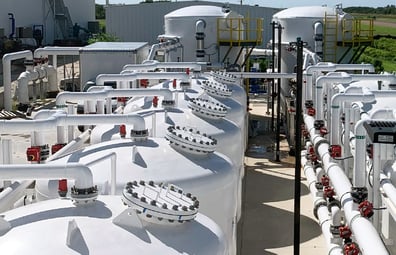Water is essential for life, but not all water is safe to drink.
Contaminants like perfluorooctanoic acid (PFOA) and perfluorooctanesulfonic acid (PFOS), collectively known as PFAS, have been a growing concern in our water supply. Fortunately, there's a remarkable solution that often goes unnoticed: carbon absorption filters. Here, we'll explore the technology behind carbon absorption filters, how they effectively trap PFAS and their numerous benefits in water treatment.
Understanding Carbon Absorption Technology
Before delving into how carbon filters combat PFAS, let’s review the fundamentals of carbon absorption technology. Activated carbon, the hero in this story, is an incredibly porous material with a vast surface area, typically derived from sources like coconut shells, wood, or coal. This porous structure is what makes activated carbon ideal for trapping contaminants.
1. Activated Carbon's Structure: Think of activated carbon like a sponge, but not just any ordinary sponge – it's a super sponge! At a microscopic level, it's filled with tiny pores and holes, creating a vast and intricate network. Imagine walking through a maze with endless twists and turns – that's what the structure of activated carbon looks like. And why does this matter? Because all those nooks and crannies provide a massive surface area. It's like having a big, open field instead of a cramped room. This extra space is perfect for grabbing onto molecules, kind of like how Velcro sticks to fabric. This process is called adsorption, where molecules stick to the surface of the carbon rather than getting soaked up inside like a regular sponge.
2. Adsorption vs. Absorption: Let's clear up some confusion between two similar-sounding words. Absorption is like when a sponge soaks up water – it goes inside the sponge. But adsorption is different; it's all about what happens on the surface. Imagine you're playing with magnets. When they attract and stick together, that's like adsorption. Activated carbon is a magnet for contaminants. It doesn't suck them in like a vacuum; instead, it attracts them and sticks them onto its surface, where they stay put. So, while absorption is about taking things in, adsorption is about grabbing onto things on the outside.
3. Adsorbent Specificity: One of the remarkable features of activated carbon is its remarkable versatility and ability to adsorb a wide range of contaminants, including volatile organic compounds (VOCs), which are harmful chemicals emitted from products like paints and cleaning supplies, chlorine, commonly found in water disinfection processes, and, most importantly, PFAS, notorious for their widespread presence in water sources and resistance to degradation, making activated carbon an indispensable tool in combating environmental pollution.
How Carbon Filters Trap PFOA and PFOS
Now, we’ll delve into the fascinating science of how carbon absorption filters effectively capture PFAS molecules:
- Chemical Attraction: The carbon's porous structure is inherently attractive to PFAS molecules due to its hydrophobic (water-repellent) nature. PFAS molecules are composed of a carbon-fluorine backbone, which readily binds to the activated carbon surface.
- Van der Waals Forces: Van der Waals forces drive the interaction between activated carbon and PFAS molecules, which are weak attractive forces between atoms or molecules. However, the cumulative effect of these forces on the massive surface area of activated carbon is substantial.
- High Surface Area: As mentioned earlier, the extensive surface area of activated carbon means numerous binding sites for PFAS molecules. This high capacity ensures the efficient removal of PFAS from water.
- Residence Time: To maximize the effectiveness of carbon absorption filters, water is typically passed through the activated carbon bed at a controlled rate, allowing sufficient contact time for PFAS adsorption.
- Competitive Adsorption: Activated carbon can also remove PFAS compounds in low concentrations due to their competitive adsorption properties. It can outcompete other substances for binding sites, even in complex water matrices.
The Benefits of Using Carbon Filters in Water Treatment
Carbon filters offer a wide range of advantages that make them a preferred choice for addressing various water quality challenges, including the removal of contaminants like PFAS (per- and polyfluoroalkyl substances) and other impurities:
High Efficiency
- Effective Contaminant Removal: Carbon filters excel at removing a diverse array of contaminants, including but not limited to chlorine, volatile organic compounds (VOCs), pesticides, herbicides, and, most notably, PFAS. Their porous structure provides an extensive surface area for adsorption, allowing them to trap these substances efficiently.
Versatility
- Broad Spectrum of Contaminants: Carbon filters are versatile and can tackle a broad spectrum of impurities in water. This versatility makes them attractive for water treatment facilities with varying water sources and contamination profiles.
Longevity
- Extended Lifespan: Carbon filters can have a relatively long lifespan when properly maintained. Regular monitoring and appropriate replacement or regeneration can significantly extend their utility, providing cost savings.
Cost-Effective
- Economical Solution: Carbon absorption filters are a cost-effective option for water treatment. Their efficiency in removing contaminants and longevity make them a prudent investment for water utilities, municipalities, and industrial facilities.
Minimal Maintenance
- Low Maintenance Requirements: Carbon filters typically require minimal maintenance compared to other water treatment methods. Routine monitoring and occasional replacement or regeneration are typically all that's needed, reducing operational costs.
Eco-Friendly
- Environmental Sustainability: The regeneration of activated carbon used in these filters can be environmentally friendly. This sustainable approach reduces the carbon footprint associated with water treatment processes, aligning with modern sustainability goals.
Improved Taste and Odor
- Enhanced Water Quality: Carbon filters not only remove contaminants but can also enhance the taste and odor of treated water. This improvement in water aesthetics can increase consumer satisfaction and compliance with drinking water standards.
Consistent Performance
- Reliability: Carbon filters provide consistent and reliable performance over time. Their efficiency remains relatively stable, ensuring a consistent, clean, and safe drinking water output.
Ease of Integration
- Compatibility: Carbon filters can be easily integrated into existing water treatment infrastructure, making them a practical choice for retrofitting or upgrading treatment facilities. Their adaptability minimizes disruptions during installation.
Reduced Health Risks
- Health Protection: Removing contaminants like PFAS is crucial for safeguarding public health. Carbon filters significantly reduce exposure to these harmful substances, which have been linked to various health issues.
Compliance with Regulations
- Regulatory Compliance: Many regions and countries have established stringent regulations for drinking water quality. Carbon filters can help water treatment facilities meet and exceed these standards, ensuring legal compliance and public safety.
Community Well-Being
- Enhanced Quality of Life: Access to clean and safe drinking water is a fundamental human right. Carbon filters are pivotal in ensuring communities have reliable access to high-quality water, improving overall well-being.
Emergency Response
- Rapid Deployment: In emergencies such as natural disasters or contamination events, carbon filters can be quickly deployed to provide immediate access to clean water. Their ease of setup and operation is invaluable during crises.
In the realm of clean water, carbon filters are the true unsung heroes.
Their remarkable ability to efficiently eliminate a broad spectrum of contaminants, their cost-effectiveness, minimal maintenance requirements, and environmentally friendly characteristics make them indispensable to contemporary water treatment strategies.
As concerns regarding PFAS contamination persist and intensify, it becomes paramount to acknowledge the invaluable role that carbon filters play in addressing this pressing issue. Water treatment facilities, regulatory bodies, and communities should view these filters as a practical and potent solution to safeguarding public health.
Carbon absorption filters are irreplaceable in maintaining the purity of our water supply and safeguarding our well-being. Their blend of cutting-edge technology and eco-conscious operation positions them as a crucial pillar in global clean water initiatives.
When implementing and optimizing carbon absorption filters within water treatment systems, DeLoach Industries, Inc. possesses an intricate understanding of the unique challenges posed by contaminants such as PFAS and is unwaveringly dedicated to delivering tailored, efficient, and sustainable filtration solutions.
Through our innovative technologies and unwavering commitment to environmental stewardship, DeLoach Industries, Inc. significantly contributes to providing communities access to safe and clean drinking water. Our unyielding commitment to excellence in water treatment ensures that the benefits of carbon absorption filters are maximized, ultimately benefiting both public health and the environment.
Click the link to learn more about Carbon Absorption and other water treatment products and solutions, or contact the professionals at DeLoach Industries, Inc. at (941) 371-4995.




